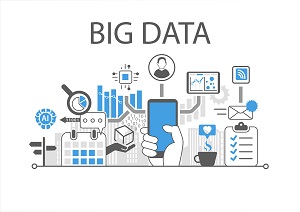The waste management industry in the United States is largely one that remains hidden in the dark. The vast majority of Americans have no idea what happens to the food or plastic wrapping they throw away after the garbage truck comes to take it once a week. Because of this, the U.S. is known as one of the most wasteful developed countries — producing over 230 million tons of trash yearly, or approximately 4.6 pounds per person per day.
Unfortunately, although nearly 70% of the waste we produce every day is recyclable, less than a quarter of it is actually recycled. This creates a great need within the waste management industry, a need that can be addressed with policies, outreach and education, and technological improvements.
Many of these tech improvements are beginning to make a noticeable appearance. The use of big data within the waste management industry has the potential to greatly increase our capacity to improve our waste management system and recycle more effectively, and could even be the turning point for greater interest in what happens to all of our waste.
Benefits of Recycling
In today’s world, there are a number of rather obvious benefits of recycling waste products rather than incinerating them or putting them into a landfill. Perhaps the most obvious is the benefit to the environment. Recycling reduces the need for raw natural resources such as timber, water, and other minerals and can help keep landfills from filling up quite so quickly.
Believe it or not, recycling can also have a substantial positive economic impact as well. One study completed in 2016 estimates that per 1,000 tons of recycled material, nearly 1.5 jobs, $76,000 in salary, and $14,000 in tax revenues were created. Many recycling supporters are also proud that recycling increases economic security by creating a stable supply of domestically sourced materials that support U.S. industries.
Although a lot of material can be recycled, it is important to understand what cannot and what creates contamination in your bin. For example, things such as shredded paper are not easily recycled, and are really better off in your compost pile. Likewise, things such as greasy pizza boxes plug up processing machines and cause more problems than their worth.
The Role of Big Data
The advent of big data is making the whole process of recycling and waste management much easier. In fact, big data has impacted many industrial and scientific realms in ways that benefit the environment. For example, it is regularly used to help scientists and land managers gain a better understanding of our changing environment and ways to combat climate change.
One way big data is making recycling more effective is through the development of a recycling robot, which makes the process of sorting solid waste much cheaper and safer. The robot works by collecting data associated with the patterns, textures, and even brand logos of the material it is sorting. As a whole, a robot can sort nearly 60 cartons of recyclables per minute!
Big data is also used to help with route planning garnering better estimates on how much waste is produced where. For instance, in Manchester, one waste management company uses big data to understand which communities are producing the most waste and targeting them for greater educational outreach on recycling. In much of Europe, recycling is free while trash disposal costs households money (the opposite of how waste is managed in the U.S.).
Big Data, Companies, and Waste Management
Big data can also be used to help major companies identify areas where they are creating waste so solutions for waste reduction can be developed. This is a hot topic right now, as many consumers are demanding cleaner, more environmentally friendly products. Many large companies are trying to become more sustainable by creating products that are less wasteful or environmentally harmful.
One way companies can become more sustainable is by reducing the amount of manufacturing waste created during product development. Big data can help here by increasing efficiency and cataloging ways that packaging materials can be reduced without damaging products. This can help to cut down on material usage significantly, and could even save companies money in the long run.
Companies can also capitalize on big data analytics to help them become more socially responsible and environmentally friendly throughout their entire supply chain. These analytics could help to identify where concerns may be so company leaders can find ways to source better alternatives. The waste management and recycling industries are ripe for the development of big data solutions to known problems. Using big data within these realms can help to make recycling more efficient and effective worldwide, which has numerous positive benefits. Likewise, big data can help companies to identify ways to become more sustainable and develop products that are better able to meet consumer demands for environmental friendliness.
About the Author

Avery Phillips is a freelance human based out of the beautiful
Treasure Valley. She loves all things in nature, especially humans.
Leave a comment down below or tweet her @a_taylorian with any questions or comments.
Sign up for the free insideAI News newsletter.





This article was a tease with zero big data related subject matter
Did the editors proof the article?
I think it was interesting to understand how big data can be used in waste management
Here in Sydney the council have started special e-waste recycling stations, they claim 95% of the waste is recovered and therefore diverted from landfill.